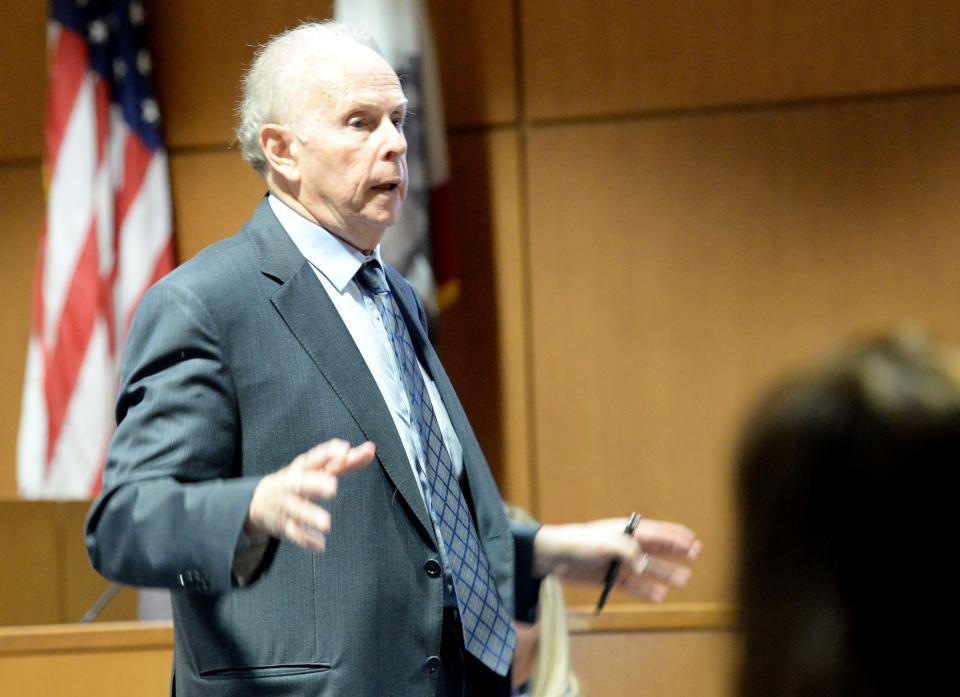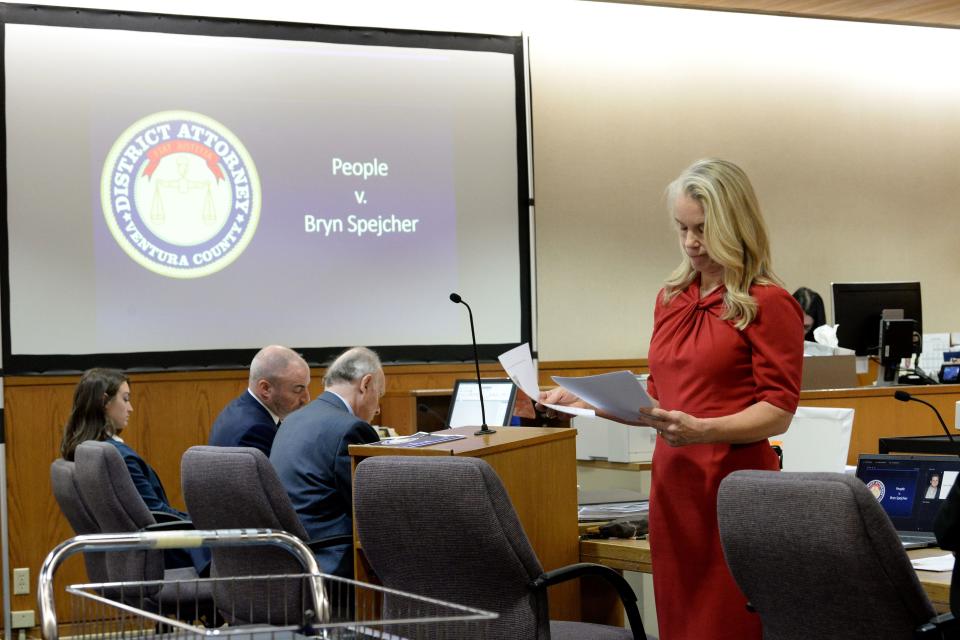Bryn Spejcher found guilty in cannabis-induced killing of man she dated
After deliberating for less than four hours Friday, a jury found Bryn Spejcher guilty of involuntary manslaughter in the 2018 killing of Chad O’Melia of Thousand Oaks.
When the verdict was read, Spejcher dropped her head to the table and cried quietly. She later broke out in loud sobs after her lawyers asked the jurors to confirm their unanimous verdict, one by one. The panel had heard evidence and arguments since Nov. 9.
Ventura County Superior Court Judge Anthony Sabo denied a motion by prosecutors to have Spejcher remanded into custody. She left the courtroom with her lawyers and her family.
Spejcher, 32, will be back in court Monday for a separate hearing on four enhancements to the manslaughter conviction, including allegations that she used a deadly weapon and that her crime involved great violence. She will be free on bail until that hearing is complete.
She waived her right to a jury trial on the enhancements, so that portion of the case will be decided by Judge David Worley, who presided over Spejcher’s trial. Worley was unavailable Friday so Sabo filled in for the verdict.
Involuntary manslaughter typically carries a sentence of up to about four years in state prison, though the enhancements could increase Spejcher’s sentence.
On the night she killed O’Melia, stabbing both him and herself repeatedly with kitchen knives, Spejcher was in what both defense and prosecution experts agreed was a severe psychotic episode triggered by marijuana she smoked from O’Melia’s bong. Prosecutors reduced the charge against her from murder to manslaughter due to those expert opinions about her mental state.

O’Melia was 26 when he was killed. He was from Santa Clarita and had graduated from Chico State University. He lived in a condo in Thousand Oaks with two roommates and his dog and was working at an accounting firm and studying to be a certified public accountant.
He met Spejcher at a dog park in the spring of 2018. They had been dating for a few weeks when she came over on the night of May 27. She stabbed him to death a little after midnight.
Sean O’Melia, Chad O’Melia’s father, attended the entire jury trail and many pretrial hearings. He said he was grateful for the hard work that prosecutors and police put in but wouldn't call the outcome “justice.”
“I just want my son back, and that’s not going to happen,” he said outside the courtroom after the verdict was delivered.
Spejcher’s defense revolved around the idea that she was “involuntarily intoxicated,” and she claimed O’Melia had pressured and intimidated her into taking the last bong hit. The jurors did not agree.
“Ultimately, there are only people that have taken a loss here. There’s no winning here,” Sean O’Melia said. “At the same time, I think the first impact to me and my family was the loss of our son, and the next thing that occurred was what we had to go through listening to … all the derogatory remarks about somebody that we had just lost.”
Sean O'Melia filed a wrongful death lawsuit against Spejcher in 2020. It has been on hold until the end of her criminal case.
Two pictures of Bryn Spejcher
The jury's swift verdict arrived on the first day of deliberations. The day before, jurors heard closing arguments from the prosecutor and from Spejcher’s attorney.

The prosecution portrayed Spejcher as a callous, narcissistic party girl who just wanted to get high the night she killed O’Melia, while the defense described her as “a very responsible young woman” who had no idea smoking pot could trigger violent psychosis.
With no disagreement about whether she killed O’Melia or whether her psychosis was real, the trial revolved around the question of whether her cannabis intoxication was voluntary.
Under California criminal law, people are responsible for their actions when impaired by alcohol or drugs unless their intoxication was involuntary. According to the jury instructions in Spejcher’s trial, “involuntary intoxication” could mean she took the drug unknowingly, took it due to “force, duress, fraud or trickery" or took it without knowing it could produce such intoxicating effects.
Robert Schwartz, Spejcher’s defense attorney, argued to the jury Thursday that multiple legal definitions of “involuntary intoxication” applied in this case. He said O’Melia pressured Spejcher to take a second, oversized bong hit and she did it because she felt intimidated by him, though O'Melia didn’t threaten her or use physical force.
Schwartz also said Spejcher couldn’t have known the weed would cause a psychotic episode because she had only consumed cannabis a handful of times in her life and had only gotten mildly high once. And he said “trickery” applied as well because she had no idea what exactly was in O’Melia’s bong when he put in front of her face, full of smoke.
There were no drugs other than marijuana found in O’Melia’s condo. Tests from 2018 of the marijuana that was found, both in a container in his bedroom and as burned residue in the bong, were not conclusive as to its concentration of THC, the psychoactive compound in cannabis.
Spejcher’s attorneys argued the cannabis she smoked was probably the same stuff O’Melia had ordered from an unlicensed medical marijuana delivery service about a week earlier: a strain called OG Kush with a THC content of 31.8%. That’s a relatively high level of THC, and on its website, the now-defunct delivery service warned potential buyers that strain was meant for “high tolerance patients only.” Spejcher’s defense team also called expert witnesses who testified that a concentrated form of cannabis could have been added to that weed, making it even stronger.
“Who knew the contents of the bong? Bryn didn’t know. Chad knew,” Schwartz told the jury. “Who purchased the marijuana? Who loaded the marijuana? Who prepared the marijuana? It was Chad. … She had no reaction at all to the first bong hit, so why in the world would she expect that when he pressured her to take another, that anything different would happen?”
In her closing argument, prosecutor Audry Nafziger called Spejcher’s contention that she didn’t like marijuana and didn’t want to get high that night “a false narrative.” Nafziger pointed to texts between Spejcher and her friends from the months leading up to O’Melia’s death, which included multiple texts from Spejcher about being drunk and once missing a morning of work due to a hangover. There were also texts from Spejcher about consuming edible forms of cannabis.

“This is a young woman who was living a lifestyle of getting drunk, passing out, missing work, and her decision to become intoxicated on May 28 resulted in the vicious and violent death of Chad O’Melia,” Nafziger said.
Nafziger told the jury there is no evidence O’Melia put anything other than “regular old marijuana” in the bong he prepared for Spejcher. She also said it’s implausible that O’Melia “made her” inhale from the bong, because Spejcher is a strong, assertive, professional woman — she holds a doctoral degree and worked as an audiologist — and was “the boss” in her relationship with O’Melia.
“She was not afraid of Chad O’Melia,” Spejcher said. “Her newfound fear is fabricated. She’s trying to save her own skin. … Anyone can point the finger at someone else and say, ‘He made me do it.’ She’s very good at blaming other people for her problems.”
Nafziger also said Spejcher didn’t show any remorse when she testified in her own defense on Tuesday.
“What we saw on the witness stand was narcissism on full display,” Nafziger said. “It was the ‘me, me, me’ show. … She had tears for herself, but none for Chad, no remorse, no compassion.”
Schwartz called Nafziger’s description of Spejcher “character assassination” and an attempt to “dirty up” the defendant. Character witnesses described her as honest and nonviolent, and she devoted her career to helping people who have hearing loss, as Spejcher herself does.
“The person who’s been depicted to you by the prosecution would be unrecognizable to anyone who knows her well,” Schwartz told the jury.
Tony Biasotti is an investigative and watchdog reporter for the Ventura County Star. Reach him at tbiasotti@vcstar.com. This story was made possible by a grant from the Ventura County Community Foundation's Fund to Support Local Journalism.
This article originally appeared on Ventura County Star: Bryn Spejcher found guilty in cannabis-induced killing of Chad O'Melia

